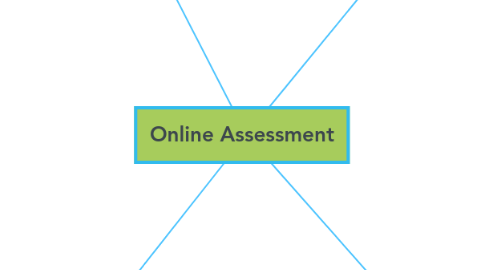
1. Processes
1.1. Outcomes
1.1.1. Clear
1.1.2. Valid
1.1.3. Appropriate
1.2. Evidence
1.2.1. Collect Efficiently
1.2.2. Address Outcomes
1.3. Dialogue
1.3.1. Create Platform
1.3.2. Collectively Interpret Data
1.4. Data
1.4.1. Improve Teaching
1.4.2. Improve Learning
2. Tools
2.1. Resources/Websites
2.1.1. Computer Adaptive Assessment
2.1.2. Alberta Assessment Consortium
2.1.3. Classroom Assessment Techniques (CATs)
2.1.4. Studymate
2.1.5. Blackboard
2.1.6. LON-CAPA
2.2. Online Educational Games
2.2.1. Food Fight
2.2.2. Quandry
2.3. Online Quiz/puzzle Builders
2.3.1. Socrative
2.3.2. Formative
2.3.3. Kahoot!
2.3.4. Google Forms
2.3.5. Quizlet
2.3.6. Discovery Puzzlemaker
3. Assessment Ideas
3.1. Formative
3.1.1. Concept mapping
3.1.2. Prior Knowledge Survey
3.1.3. Focused listing
3.1.4. Blogging/journals
3.1.5. Practice Quizes
3.2. Summative
3.2.1. Online Tests
3.2.2. Peer review and feedback
3.2.3. Online Assignments
4. Benefits
4.1. Teachers
4.1.1. Wealth of tools available for all subject curriculums
4.1.2. Identify student strengths and weaknessses
4.1.3. Assessment preparation time is reduced
4.2. General
4.2.1. Immediate data is gathered for easy and prompt feedback
4.2.2. Questions are tailored to previous results of student ability
4.2.3. Assessments are more flexible, particularly time-wise
4.2.4. Reports of achievement are curriculum-based
